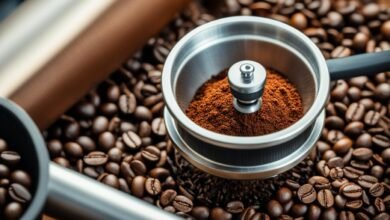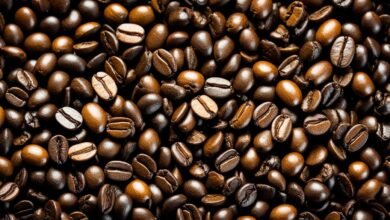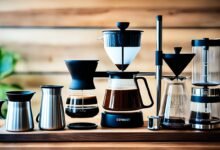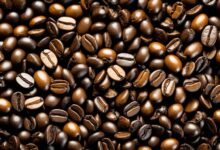The Importance of Water Quality in Coffee Brewing

As a true coffee connoisseur, I’ve always been fascinated by the intricate interplay between water and coffee. The quality of the water used in the brewing process can make a profound difference in the taste, aroma, and overall satisfaction of a cup of coffee. It’s a subtle yet crucial element that can elevate or diminish the entire coffee experience.
Have you ever noticed how the same coffee beans can taste dramatically different depending on where you brew them? That’s because the composition, pH level, and temperature of the water used can greatly impact the extraction of the coffee’s flavors. Understanding the role of water quality in coffee brewing is the key to unlocking the true potential of your favorite roast.
Key Takeaways
- Water quality is a critical factor in producing the perfect cup of coffee.
- The composition, pH, and temperature of the water can significantly impact the taste and aroma of the coffee.
- Factors like water hardness, mineral content, and chlorine levels can influence the final flavor profile.
- Investing in a quality water filtration system can help ensure consistent, high-quality coffee brewing.
- Understanding the science behind water quality and its effects on coffee can help you become a true coffee master.
Introduction to Water Quality in Coffee Brewing
When it comes to brewing the perfect cup of coffee, water quality is a critical factor. The composition of the water, including its mineral content, pH, and temperature, can have a significant impact on the flavor and aroma of the final brew. Understanding the role of water quality in coffee brewing is essential for coffee enthusiasts and professionals alike.
Why Water Quality Matters
Water is the primary component of coffee, making up 98-99% of a typical cup. The quality of the water used in the brewing process can enhance or diminish the inherent flavors and aromas of the coffee beans. Minerals such as calcium and magnesium, for instance, can improve the body and mouthfeel of the coffee, while the pH level of the water can affect the balance and bitterness of the brew.
The Impact of Water Composition on Flavor
The diverse flavor profiles of coffee from different regions are influenced by the water’s mineral content, pH, and temperature. Hard water, which is rich in calcium and magnesium, can enhance certain flavor notes but may lead to over-extraction and a bitter taste. Soft water, on the other hand, may not extract flavors as effectively, resulting in a flat or under-extracted brew. The balance between total hardness and alkalinity plays a crucial role in determining the coffee’s acidity level and overall flavor profile.
“Water that contains noticeable off-flavors like chalkiness, metallic taste, or soapiness is not recommended for brewing coffee.”
Additionally, the presence of other minerals, such as sodium or bicarbonates, can also impact the taste of the coffee, potentially making it slightly saltier or altering the acidity levels. Understanding the water composition and how it interacts with the coffee is key to achieving the desired flavor and aroma in the final brew.
Understanding Water Hardness
Water hardness is a crucial factor in coffee brewing that often goes overlooked. It refers to the mineral content in water, specifically the concentration of calcium and magnesium ions. These minerals naturally dissolve in water as it passes through rocks and soil, giving it varying degrees of hardness.
Measuring Water Hardness
Water hardness is typically measured in parts per million (ppm) or milligrams per liter (mg/L). The ideal water hardness for brewing espresso is considered to be between 50-80 ppm, with the recommendation matching the Speciality Coffee Association (SCA) ideal of 60 ppm and Hendon et al. suggesting 68 ppm hardness. It is noted that the upper limits of flavor enhancement are generally not found to be beyond 90 ppm based on the study conducted.
Effects of Hard and Soft Water on Coffee
The hardness of your water can have a significant impact on the taste and quality of your coffee. Hard water, with its high mineral content, can interact with the coffee grounds, leading to a bitter or unpleasant taste and affecting the extraction process. Soft water, on the other hand, can lead to over-extraction, resulting in a bitter brew. Understanding the hardness of your water is essential for achieving the perfect cup of coffee.
| Water Hardness | Effects on Coffee |
|---|---|
| Hard Water | Can result in a bitter or unpleasant taste and affect the extraction process |
| Soft Water | Can lead to over-extraction, resulting in a bitter brew |

Understanding the hardness of your water is crucial for achieving the perfect cup of coffee. By optimizing the mineral content, you can ensure a balanced and flavorful brew that brings out the best in your coffee beans.
Coffee Water Quality
The quality of the water used in coffee brewing has a profound impact on the final flavor, aroma, and overall experience of the coffee. The mineral balance, pH, and purity of the water all play a crucial role in extracting the optimal flavors from the coffee beans. Ensuring the water used for brewing is of high quality, free from contaminants, and has the right mineral composition can make a substantial difference in the quality of the coffee.
Research suggests that the ideal hardness range for brewing coffee is between 50-80 parts per million (ppm), with a recommended range of 60-68 ppm. Studies have found that water with this mineral balance can enhance the extraction of key flavor compounds, leading to a more balanced and flavorful cup of coffee.
The pH of the water is also crucial, with the optimal range being between 7 and 8.5. As the pH increases, the flavor extraction tends to improve, with the research indicating that a pH of 7.7 or higher is ideal for maximizing the extraction of vanillin and other key flavor compounds.
In addition to the mineral balance and pH, the total dissolved solids (TDS) in the water can also impact the flavor extraction. The recommended TDS range for brewing coffee is around 150ppm, as this helps ensure a consistent and predictable brewing process.
| Water Quality Factor | Optimal Range | Impact on Coffee Flavor |
|---|---|---|
| Hardness | 60-68 ppm | Enhances flavor extraction and balance |
| pH | 7 – 8.5 | Improves flavor extraction, particularly of vanillin |
| Total Dissolved Solids (TDS) | 150 ppm | Ensures consistent and predictable brewing |
To ensure the best possible coffee quality, it is recommended to use filtered water that has been treated to remove impurities and maintain the ideal mineral balance. This not only enhances the flavor of the coffee but also helps extend the lifespan of your coffee brewing equipment.
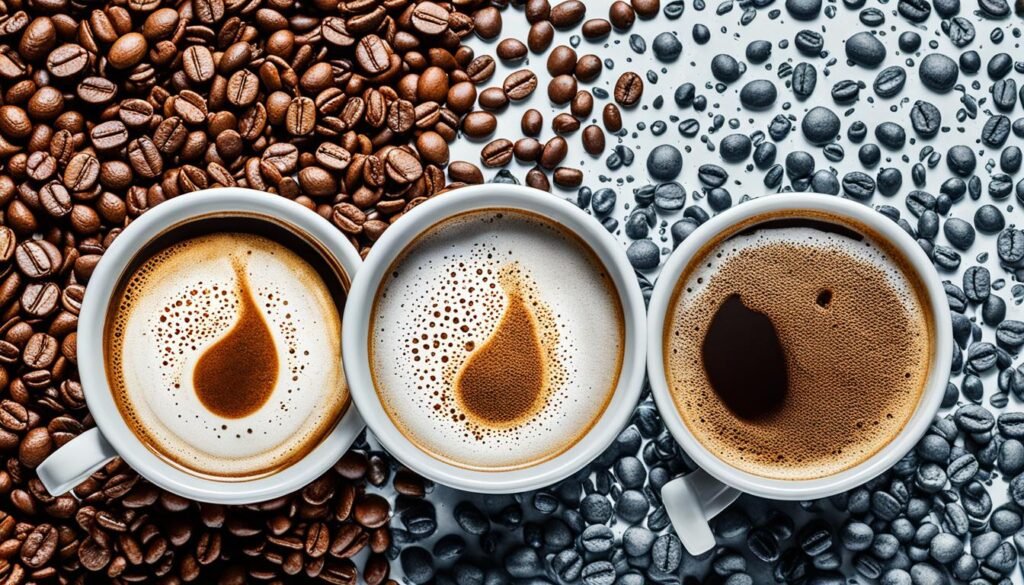
“Around 98% of a cup of coffee is water, so the quality of that water is crucial in determining the final flavor profile.”
Temperature and Water Quality
The temperature of the water used in the coffee brewing process is a critical factor that can significantly impact the overall flavor and aroma of the final cup. The ideal water temperature range for brewing coffee is between 195 to 205 degrees Fahrenheit (90 to 96 degrees Celsius).
Optimal Brewing Temperature
Water that is too hot, exceeding the recommended range, can lead to over-extraction, resulting in a bitter or burnt taste. Conversely, water that is too cold may not fully extract the nuanced flavors from the coffee grounds, leading to a flat or lackluster cup. By using water at the optimal temperature range, you can ensure that the flavors in your coffee are perfectly balanced and extracted, resulting in a delicious and aromatic cup of coffee.
Temperature’s Effect on Extraction
The temperature of the water plays a crucial role in the extraction process. Lighter roast coffees may benefit from a slightly higher brewing temperature, around 205°F (96°C), to speed up the extraction and fully unlock their complex flavors. On the other hand, darker roast coffees are best brewed at a lower temperature, around 195°F (91°C), to prevent over-extraction and the development of undesirable bitter or burnt notes.
To ensure consistent and optimal brewing, many coffee makers are designed to maintain the ideal water temperature range. The Specialty Coffee Association of America (SCAA) certifies drip coffee makers that can achieve and maintain the recommended brewing temperature, ensuring a high-quality coffee experience every time.
“The ideal water temperature for brewing coffee is between 195°F and 205°F (90°C to 96°C) to ensure the perfect balance of flavors and aromas.”
Improving Water Quality for Coffee Brewing
Achieving the perfect cup of coffee starts with the quality of the water used in the brewing process. Water makes up approximately 98% of a cup of coffee, so its composition, mineral content, and overall purity are crucial for extracting the desired flavors and aromas from the coffee grounds. Investing in water filtration, softening, or purification systems can significantly enhance the quality of your coffee.
One effective solution is to install a dedicated water filter designed specifically for coffee brewing. These filters can remove impurities like chlorine, lead, and other contaminants that can impart unwanted flavors to your coffee. Alternatively, you can opt for pre-filtered bottled water or spring water that has been carefully purified to have the right mineral balance for optimal coffee extraction.
Another DIY approach is to brew your own mineral water at home. Start with filtered tap water and add a pinch of food-grade minerals to achieve the perfect mineral balance for your coffee. This allows you to customize the water composition to suit your specific brewing preferences and the origin of your coffee beans.
| Water Treatment Method | Benefits |
|---|---|
| Water Filtration | Removes impurities like chlorine, lead, and contaminants that can affect coffee flavor |
| Bottled/Spring Water | Carefully purified and balanced for optimal coffee brewing |
| DIY Mineral Water | Allows for customization of mineral content to suit personal preferences and coffee beans |
Regardless of the approach, maintaining consistent water quality is crucial for achieving the intended flavor profiles of your coffee, especially for coffee subscriptions or different brewing methods like espresso, drip, French press, and cold brew.
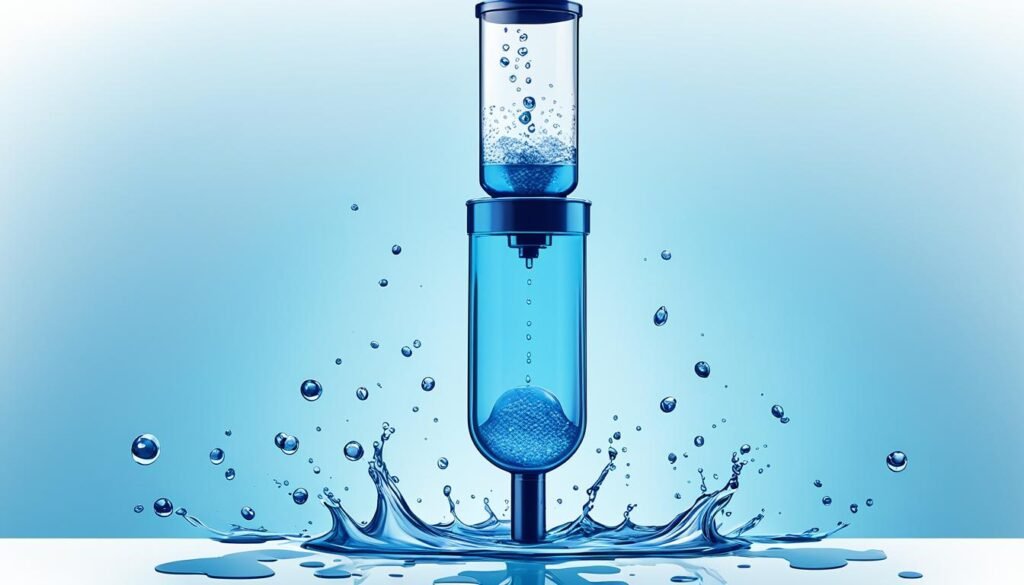
“Water quality is often overlooked, but it’s one of the most important factors in brewing great coffee. Investing in a good water filtration system can make a significant difference in the taste of your coffee.”
Water Filtration Systems
One of the simplest ways to improve water quality for coffee brewing is by using a water filtration system. These systems are designed to remove impurities, contaminants, and unwanted minerals from the water, resulting in a cleaner, more consistent water source for brewing coffee.
Types of Water Filters
There are various types of water filters available, including pitcher-style filters, faucet-mounted filters, and whole-house filtration systems. Each type offers unique benefits and features, catering to different water quality needs and preferences.
- Pitcher-style filters, such as those from Brita, are a popular and convenient option for home use, providing a simple way to filter water directly at the point of use.
- Faucet-mounted filters can be easily installed on your kitchen tap, offering on-demand access to filtered water for coffee brewing and other domestic uses.
- Whole-house filtration systems are a more comprehensive solution, treating the water supply for an entire building or home, ensuring consistent water quality throughout the plumbing system.
Benefits of Using Filtered Water
By using filtered water, you can avoid the issues associated with hard or soft water, such as mineral buildup, over-extraction, or off-flavors, and enjoy a more enjoyable and consistent coffee-drinking experience. Filtered water can also prolong the lifespan of your coffee equipment by preventing scale buildup and corrosion.
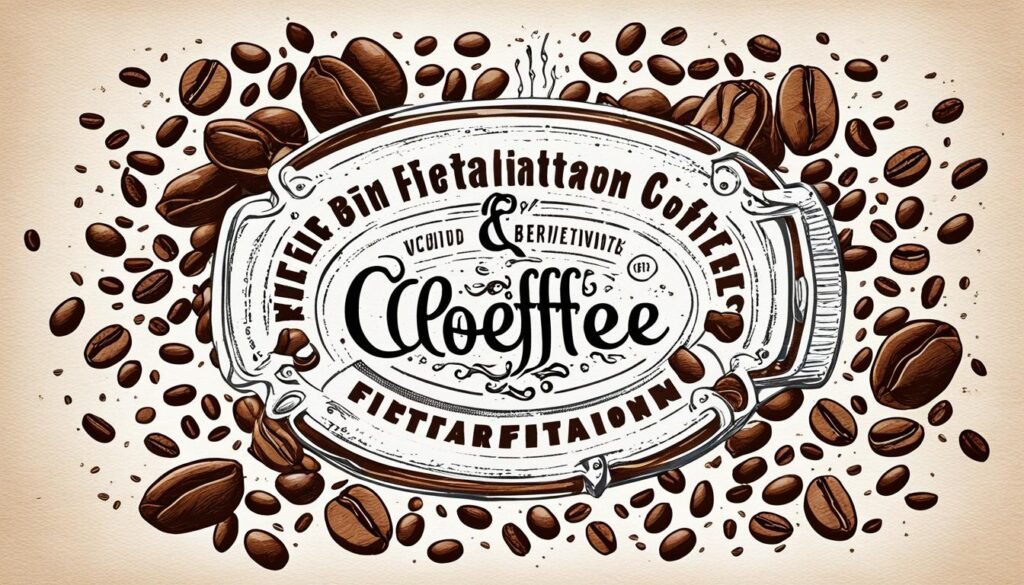
“Using filtered water can result in better-tasting coffee by removing impurities, chlorine, and undesirable elements.”
Moreover, investing in a high-quality water filtration system can save you money in the long run by reducing the need for costly equipment replacements and maintenance. Whether you’re a home brewer or running a coffee shop, incorporating a reliable water filtration solution can elevate your coffee experience and ensure consistent, flavorful results.
Testing Water Quality for Coffee
Assessing the water quality is a crucial step in ensuring the best possible coffee experience. Home testing kits provide a convenient and affordable way to get an initial understanding of your water’s pH, mineral content, and other key parameters.
These home testing kits typically include test strips that you can dip into your water sample and compare the results to a color-coded chart. For a more comprehensive analysis, you can also send a water sample to a professional laboratory for detailed testing. This option provides a more accurate and thorough assessment of your water’s composition, which can be particularly useful for coffee connoisseurs looking to optimize their brewing process.
Home Testing Kits
Home water quality testing kits are a simple and cost-effective way to get a basic understanding of your water’s properties. These kits often include test strips that measure parameters such as:
- pH
- Total Dissolved Solids (TDS)
- Water hardness
- Alkalinity
- Chlorine levels
By dipping the test strips into your water sample and comparing the results to the provided color chart, you can quickly identify any potential issues that may affect your coffee brewing.
Professional Testing Services
For a more comprehensive analysis, professional water testing services can provide a detailed report on the composition of your water. These services typically involve sending a water sample to a specialized laboratory, where it undergoes a series of advanced tests to determine:
- Mineral content (e.g., calcium, magnesium, sodium)
- Chloride and sulfate levels
- Total Hardness and Alkalinity
- Presence of any contaminants
The resulting report can give you a deeper understanding of your water’s characteristics and help you make informed decisions about the best water treatment options for your coffee brewing needs.
“Knowing the quality of your water is crucial for brewing the perfect cup of coffee. Testing is the first step to ensuring your water is optimized for the best possible flavor.”
Maintaining Brewing Equipment
Proper maintenance of your coffee brewing equipment is essential for ensuring consistent, great-tasting coffee. Mineral buildup, coffee grounds, and other debris can affect the performance and lifespan of your machine, impacting the quality of your brews. Regular coffee machine maintenance, including cleaning and descaling, is crucial to prevent these issues and protect your investment.
One of the primary maintenance tasks is cleaning the brew basket regularly. This simple step helps prevent clogs and keeps your machine running smoothly. For auto-drip machines, it’s also important to rinse the carafe and brew basket after each use. Additionally, descaling the water reservoir every 6-12 months, using a citric acid solution, can effectively remove mineral buildup and keep your machine in top condition.
Proper water filtration is another essential aspect of maintaining your brewing equipment. By using filtered water, you can reduce the amount of scale buildup and ensure that your coffee consistently tastes its best. Replacing water filters at the recommended intervals is a straightforward way to maintain water quality and protect your machine.
Finally, storing your equipment properly in a cool, dry place can help extend its lifespan. Regular cleaning and maintenance of your coffee brewing setup will not only preserve the quality of your coffee but also save you money in the long run by preventing costly repairs or premature replacements.
“Regular cleaning and descaling of your machine, along with the use of filtered water, can help prevent mineral buildup and ensure the continued delivery of high-quality coffee.”
Coffee Machines and Water Quality
Crafting the perfect cup of coffee requires more than just the right beans and brewing method. The quality of the water used in the brewing process plays a crucial role in determining the final flavor profile. Fortunately, many modern coffee machines are designed with features that help maintain water quality and optimize the coffee-making experience.
Features for Water Quality Control
Some coffee machines come equipped with built-in water filters or softening systems to remove impurities and adjust the mineral content of the water. These features help ensure the water is optimized for brewing, reducing the risk of off-flavors or scale buildup within the machine.
Additionally, many coffee machines offer temperature control settings, allowing users to heat the water to the ideal brewing temperature. This helps maximize the extraction of flavors from the coffee grounds, resulting in a more balanced and nuanced cup of coffee.
Maintaining Coffee Machines
Proper maintenance of your coffee machine is also essential for preserving water quality and extending the life of your equipment. Regular cleaning and descaling helps remove mineral deposits and other buildup that can impair the machine’s performance and the taste of your coffee.
By choosing a coffee machine with advanced water quality features and caring for it diligently, you can consistently brew delicious, high-quality coffee that showcases the true character of your favorite beans.
| Feature | Benefit |
|---|---|
| Built-in Water Filtration | Removes impurities and optimizes mineral content for better-tasting coffee |
| Temperature Control | Ensures the water is heated to the optimal brewing temperature |
| Routine Cleaning and Descaling | Prevents mineral buildup and preserves the machine’s performance |
The Role of pH in Coffee Brewing
When it comes to brewing a delectable cup of coffee, the pH level of the water plays a crucial role in determining the overall flavor profile. The ideal pH range for coffee brewing is between 6.5 and 7.5, as this helps maintain a balanced and harmonious taste.
Coffee is a weakly acidic drink, with a pH ranging from 5 to 6. If the water used for brewing is too acidic (low pH), it can result in a sour and unpleasant taste. Conversely, water that is too alkaline (high pH) can lead to a bitter and imbalanced flavor. By ensuring the pH of the water is within the optimal range, you can help extract the best possible flavors from the coffee beans and achieve a well-rounded, satisfying cup.
The Specialty Coffee Association of America recommends a Total Dissolved Solids (TDS) value between 125-175 ppm as ideal for coffee extraction. This balance of minerals and pH helps to create a harmonious flavor profile, with the recommended brewing water standard including a TDS of 120-130 ppm, a pH level of 7.0, and a water hardness of 70-80 mg/L.
| Water Characteristic | Recommended Range |
|---|---|
| pH | 6.5 – 7.5 |
| TDS | 125 – 175 ppm |
| Water Hardness | 70 – 80 mg/L |
| Alkalinity | 40 – 70 ppm |
By understanding the role of pH in coffee brewing and maintaining the optimal water composition, you can ensure that your coffee consistently delivers a well-balanced, flavorful, and satisfying experience.
“Properly balanced water quality with moderate hardness and softness is ideal for extracting coffee.”
Conclusion
In conclusion, the quality of the water used in coffee brewing is a critical factor that can make a significant difference in the taste, aroma, and overall enjoyment of your coffee. By understanding the importance of water composition, pH, temperature, and mineral content, you can take steps to improve the quality of your brewing water and achieve the perfect cup of coffee every time.
This may involve investing in water filtration systems, testing your water’s quality, and properly maintaining your coffee brewing equipment. By paying attention to these details, you can elevate your coffee experience and consistently brew exceptional coffee that showcases the full flavor potential of your favorite beans.
Whether you are a home brewer or a professional barista, mastering the art of water quality for coffee brewing is a crucial step in your journey to crafting the perfect cup. By incorporating the right techniques and technologies, you can unlock the true flavor profile of your coffee and enhance the overall coffee-drinking experience.
